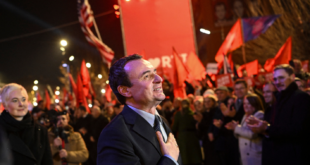The public prosecutor in Belgrade dropped the case against General Vladimir Trifunovic and four officers of the Yugoslav People’s Army.
In 1995, Trifunovic was sentenced to seven years in prison for the 1991 pullout of 250 soldiers from the JNA army barracks in Varazdin, Croatia.
Last year, the Serbian Supreme Court overruled the judgment and ordered a new trial.
The initial indictment was brought by the Military Prosecution on January 30, 1992, for the “criminal act of undermining military and defense capabilities”, Tanjug agency reports.
The decision to drop the case came after it was determined that the accused “acted out of extreme necessity” during the retreat of the army and that there were no elements of the criminal act of undermining military and defense capabilities.
Trifunovic was released after one year in prison by a decree from then Yugoslav president Zoran Lilic, but the verdict against him was not overturned.
Trifunovic is known as a very controversial figure and has been prosecuted in three countries, Slovenia, Croatia and Serbia. In the first two he was indicted for war crimes, and in Serbia for treason.
In Croatia he was sentenced to 15 years in prison for the destruction of the city of Varazdin. In Slovenia he was investigated for his role in the war in the spring of 1991.
The Serbia Military Prosecution charged him based on allegations that while pulling out his soldiers, he made it possible for the Croatian Army to arm itself with heavy equipment, tanks, artillery and rockets.
In Croatia the battle in Varazdin is also known as the War for the Barracks.
The JNA barracks in Varazdin were the largest in Croatia and the headquarters of the 32nd Corps. In the night between 13 and 14 September 1992, the Croatian Army blocked the barracks, cutting off electricity, water and supplies. Fighting started on the 15th when the JNA started the air bombing of Varazdin.
After one week of fighting, General Trifunovic surrendered and pulled out his soldiers.
Ammunition captured from the barracks, including the one in Varazdin, provided the Croatian Army with 140 tanks and enabled the Croatians to form the first tank battalion by October 1991.
Since the mid nineties, different organisations in Serbia have been campaigning for General Trifunovic, claiming that he saved the lives of his soldiers by pulling them out of the barracks.
After the case was dropped, Trifunovic announced that he would ask for full rehabilitation from Serbia.
 Eurasia Press & News
Eurasia Press & News



